|
Sun | Mon | Tue | Wed | Thu | Fri | Sat |
|---|
January | January | January | January | 1 | 2 | 3 |
4 | 5 | 6 | 7 - Understanding our Political Economy
Session 3 6:30 pm-8:00 pm 2024.02.07 149 East 38th Street, New York, NY 10016 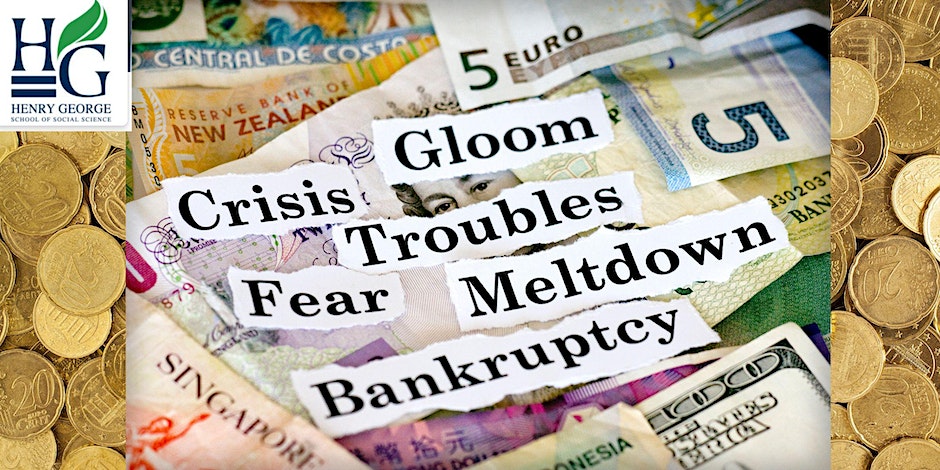 Understanding our Political EconomyThis course explains the fundamental relations between the factors of production utilized in the process of wealth creation and the natural laws that govern its distribution. We will use the interdisciplinary approach employed by Henry George in his writings to provide cohesive, evidence-based insights into why economies experience cycles of boom and bust. Additionally, the course will explain why societies continue to experience generational poverty and what measures can be adopted to bring these problems to an end. The instructor, Edward J. Dodson is a retired banker, former director and long time faculty member of the Henry George School of Social Science. Dates: Wednesdays – 1/24, 1/31, 2/7, 2/14, 2/21, 2/28, 3/6, 3/13, 3/20, 3/27 Time: 6:30 PM – 8:00 PM ET Location: Online via Zoom Note: This is an online event. After registration, the Zoom link, along with the Meeting ID and Passcode, will be provided via email the day of each session. REGISTER NOW
| 8 | 9 | 10 |
11 | 12 - McGirt v. Oklahoma: Unraveling the Impact on Tribal Economics and Sovereignty
Seminar 6:30 pm-7:30 pm 2024.02.12 149 East 38th Street, New York, NY 10016 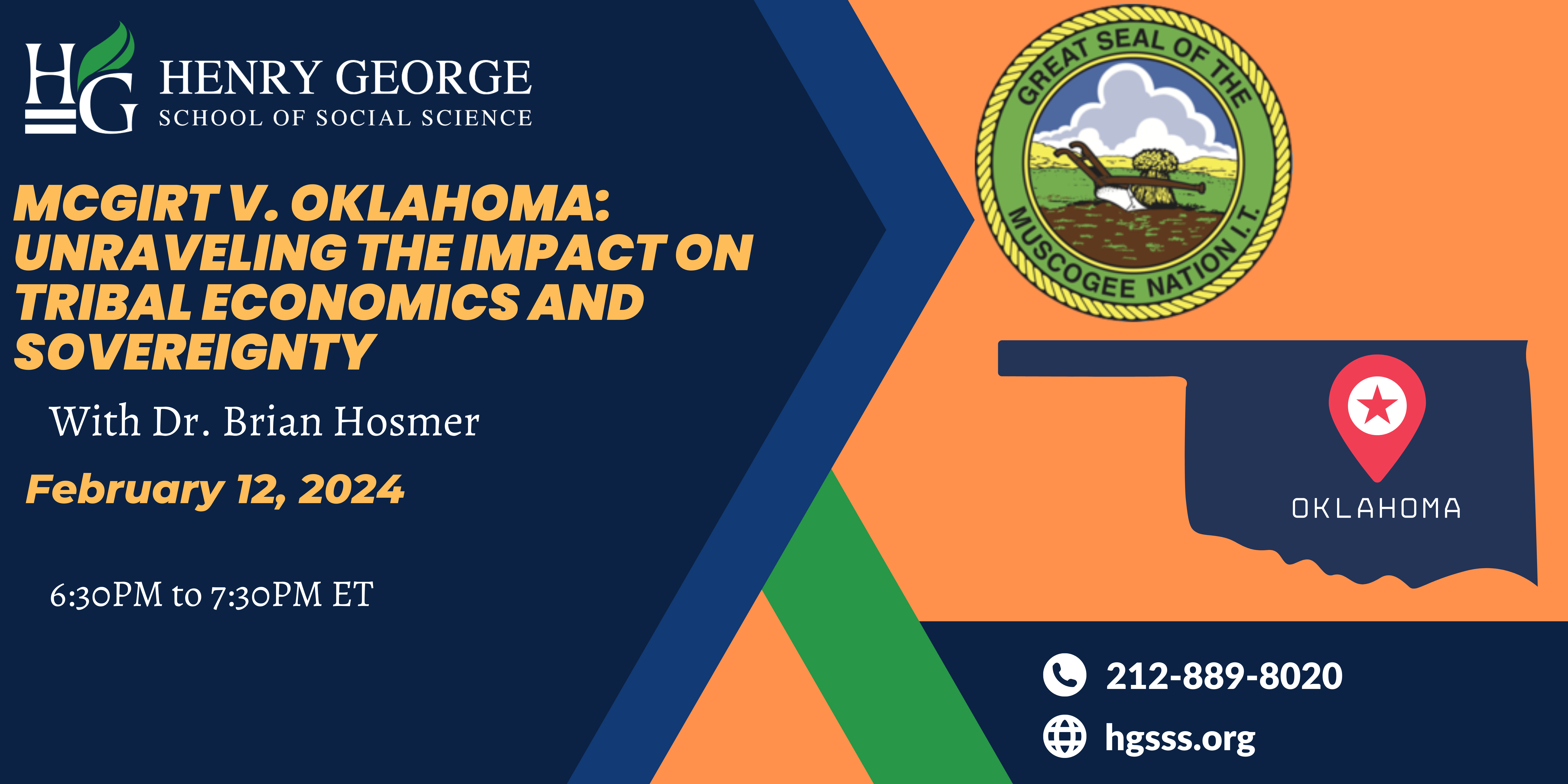 MCGIRT V. OKLAHOMA: UNRAVELING THE IMPACT ON TRIBAL ECONOMICS AND SOVEREIGNTY
The US Supreme Court’s landmark decision in McGirt v. Oklahoma (2020) potentially reorders relationships between tribal nations and US States. While limited to criminal jurisdiction in specific areas, the overheated reaction on the part of state officials coupled with the tribes’ cautious yet firm assertions of sovereignty suggests more than what first meets the eye. In this lecture, Dr. Hosmer considers tribal economics and sovereignty through two standpoints: first, the growth of scholarly interest in economic change inside and around Indigenous nations; and second, the dramatic growth and transformation of tribal economies. Sign up now to learn the specifics of each standpoint and explore the intricate details in this thought-provoking lecture! Brian Hosmer is a senior scholar in American Indian history and studies. His work pivots around intersections between economic change and tribal nationhood in the 20th century. His most important publications include: American Indians in the Marketplace, Native Pathways, Tribal Worlds, and American Indians and the Legacy of Harry S. Truman. For several years he directed the Newberry Library’s celebrated D’Arcy McNickle Center for Native and Indigenous Studies. He currently serves as Head of the Department of History at Oklahoma State University. Instructor: Dr. Brian Hosmer Date: Mon, February 12, 2024
Time: 6:30 PM — 7:30 PM ET Note: This is an online event. After registration, the Zoom link, along with the Meeting ID and Passcode, will be provided via email the day of the session.
| 13 | 14 - Understanding our Political Economy
Session 4 6:30 pm-8:00 pm 2024.02.14 149 East 38th Street, New York, NY 10016  Understanding our Political EconomyThis course explains the fundamental relations between the factors of production utilized in the process of wealth creation and the natural laws that govern its distribution. We will use the interdisciplinary approach employed by Henry George in his writings to provide cohesive, evidence-based insights into why economies experience cycles of boom and bust. Additionally, the course will explain why societies continue to experience generational poverty and what measures can be adopted to bring these problems to an end. The instructor, Edward J. Dodson is a retired banker, former director and long time faculty member of the Henry George School of Social Science. Dates: Wednesdays – 1/24, 1/31, 2/7, 2/14, 2/21, 2/28, 3/6, 3/13, 3/20, 3/27 Time: 6:30 PM – 8:00 PM ET Location: Online via Zoom Note: This is an online event. After registration, the Zoom link, along with the Meeting ID and Passcode, will be provided via email the day of each session. REGISTER NOW
| 15 | 16 | 17 |
18 | 19 - PRESIDENTS’ DAY
All day 2024.02.19 PRESIDENTS’ DAY We are closed. - Henry George and the Money Question
Seminar 6:30 pm-7:30 pm 2024.02.19 149 East 38th Street, New York, NY 10016 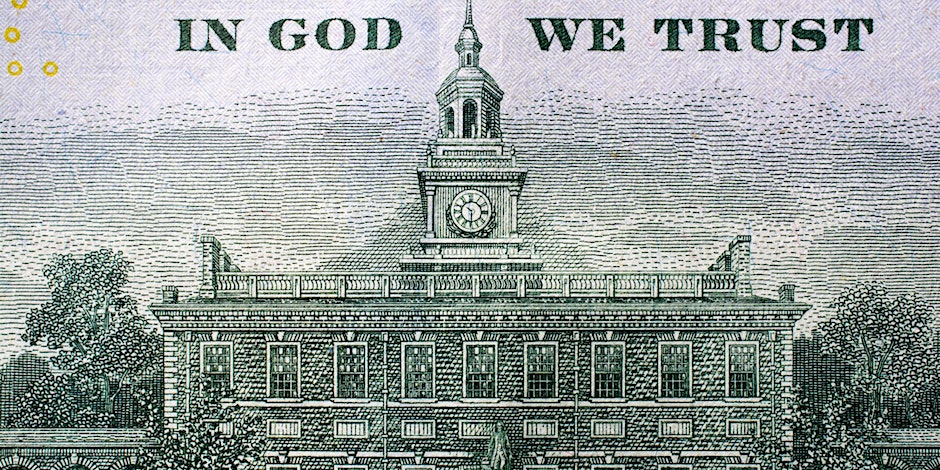 HENRY GEORGE AND THE MONEY QUESTION
There’s a widely held belief that George’s views on money were not well developed, that he waited until his last book to really delve into that topic, and left it, sadly, unfinished. However, monetary scholar Stephen Zarlenga contends that by 1884, George already had a very advanced understanding of how money works and that it is still relevant today. In this webinar, Dr. Marty Rowland will summarize Zarlenga’s findings on money, demonstrating that George spoke often about money, even in earlier books, including Social Problems, Protection and Free Trade, and in his newspaper, The Standard. Instructor: Dr. Marty Rowland Date: Mon, February 19, 2024
Time: 6:30 PM — 7:30 PM ET Note: This is an online event. After registration, the Zoom link, along with the Meeting ID and Passcode, will be provided via email the day of the session.
| 20 | 21 - Understanding our Political Economy
Session 5 6:30 pm-8:00 pm 2024.02.21 149 East 38th Street, New York, NY 10016  Understanding our Political EconomyThis course explains the fundamental relations between the factors of production utilized in the process of wealth creation and the natural laws that govern its distribution. We will use the interdisciplinary approach employed by Henry George in his writings to provide cohesive, evidence-based insights into why economies experience cycles of boom and bust. Additionally, the course will explain why societies continue to experience generational poverty and what measures can be adopted to bring these problems to an end. The instructor, Edward J. Dodson is a retired banker, former director and long time faculty member of the Henry George School of Social Science. Dates: Wednesdays – 1/24, 1/31, 2/7, 2/14, 2/21, 2/28, 3/6, 3/13, 3/20, 3/27 Time: 6:30 PM – 8:00 PM ET Location: Online via Zoom Note: This is an online event. After registration, the Zoom link, along with the Meeting ID and Passcode, will be provided via email the day of each session. REGISTER NOW
| 22 | 23 | 24 |
25 | 26 - Silvio Gesell: Beyond Capitalism vs. Socialism?
Session 1 6:30 pm-7:30 pm 2024.02.26 149 East 38th Street, New York, NY 10016 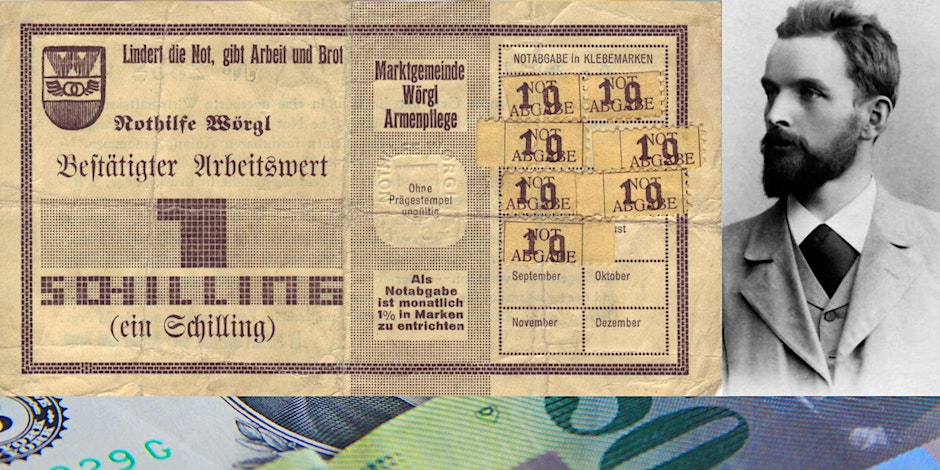 Silvio Gesell: Beyond Capitalism vs. Socialism?This course will examine how Gesell’s life experiences led him to a unique understanding of the creation and distribution of wealth. He concluded that the central idea of the free-market system is theoretically sound. However, it has never been properly implemented due to two fundamental flaws — an irrational form of money and the private ownership of land. Gesell’s simple yet radical analysis explains how these two factors are the primary causes of poverty, wealth inequality, economic instability, and a “growth imperative” that is at odds with the laws of nature. 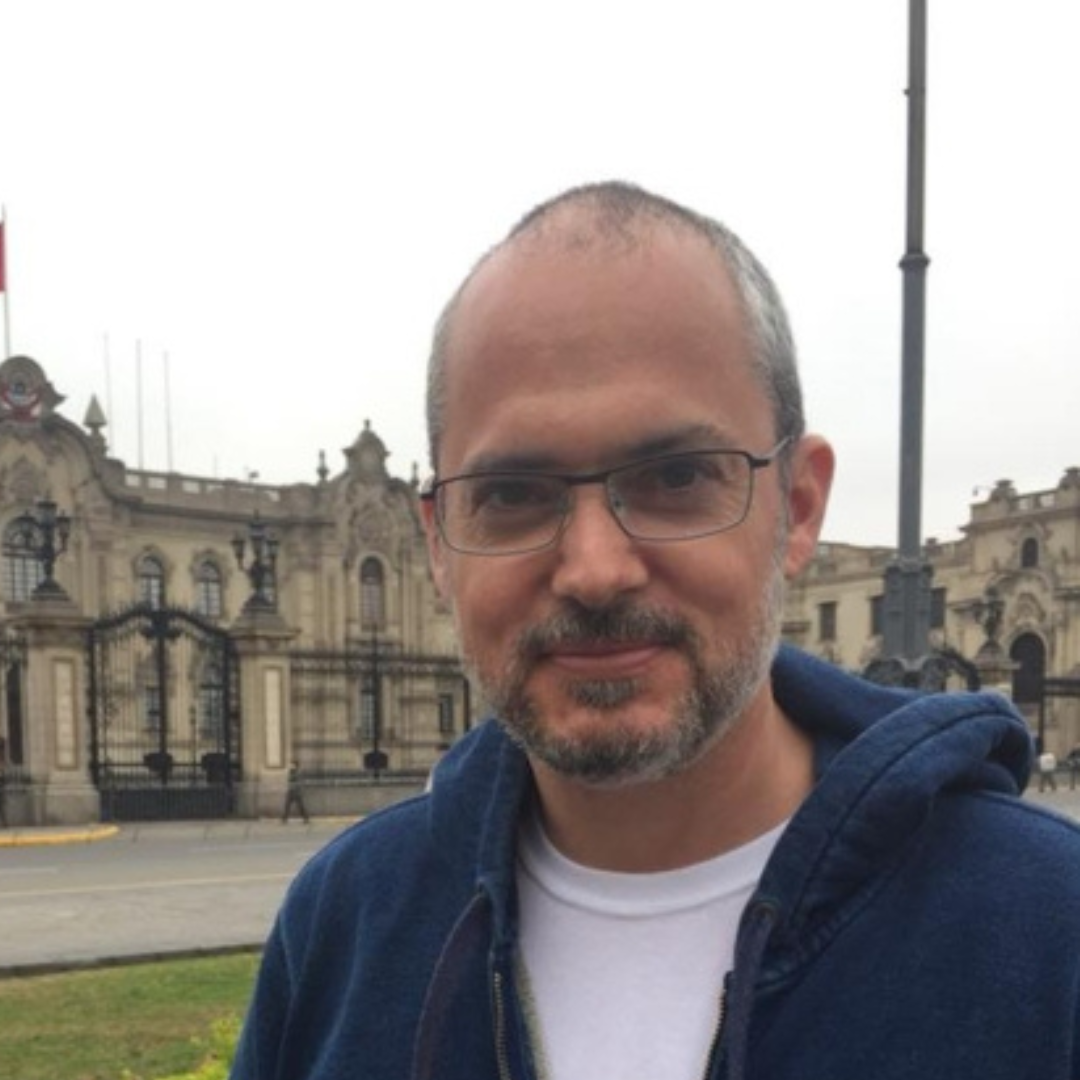 The instructor, Josh Sidman studied economics and Japanese language at Union College in Schenectady, NY. Following graduation he went to work on Wall Street, first as a financial analyst at Goldman Sachs in New York, and then as a Japanese equity derivatives trader at Morgan Stanley in London and Tokyo. Josh is the founder and director of the Silvio Gesell Foundation, aTennessee-based organization dedicated to promoting the theories and proposals of Silvio Gesell. The instructor, Josh Sidman studied economics and Japanese language at Union College in Schenectady, NY. Following graduation he went to work on Wall Street, first as a financial analyst at Goldman Sachs in New York, and then as a Japanese equity derivatives trader at Morgan Stanley in London and Tokyo. Josh is the founder and director of the Silvio Gesell Foundation, aTennessee-based organization dedicated to promoting the theories and proposals of Silvio Gesell.
Dates: Mondays – 2/26, 3/04, 3/11, 3/18, 3/25, 4/03, 4/10, 4/17 Time: 6:30 PM – 7:30 PM ET; Sessions on 4/10 and 4/17 will be 6:30 PM – 8:30 PM ET Location: Online via Zoom Note: This is an online event. After registration, the Zoom link, along with the Meeting ID and Passcode, will be provided via email the day of each session. REGISTER NOW
| 27 | 28 - Understanding our Political Economy
Session 6 6:30 pm-8:00 pm 2024.02.28 149 East 38th Street, New York, NY 10016  Understanding our Political EconomyThis course explains the fundamental relations between the factors of production utilized in the process of wealth creation and the natural laws that govern its distribution. We will use the interdisciplinary approach employed by Henry George in his writings to provide cohesive, evidence-based insights into why economies experience cycles of boom and bust. Additionally, the course will explain why societies continue to experience generational poverty and what measures can be adopted to bring these problems to an end. The instructor, Edward J. Dodson is a retired banker, former director and long time faculty member of the Henry George School of Social Science. Dates: Wednesdays – 1/24, 1/31, 2/7, 2/14, 2/21, 2/28, 3/6, 3/13, 3/20, 3/27 Time: 6:30 PM – 8:00 PM ET Location: Online via Zoom Note: This is an online event. After registration, the Zoom link, along with the Meeting ID and Passcode, will be provided via email the day of each session. REGISTER NOW
| 29 | March | March |
